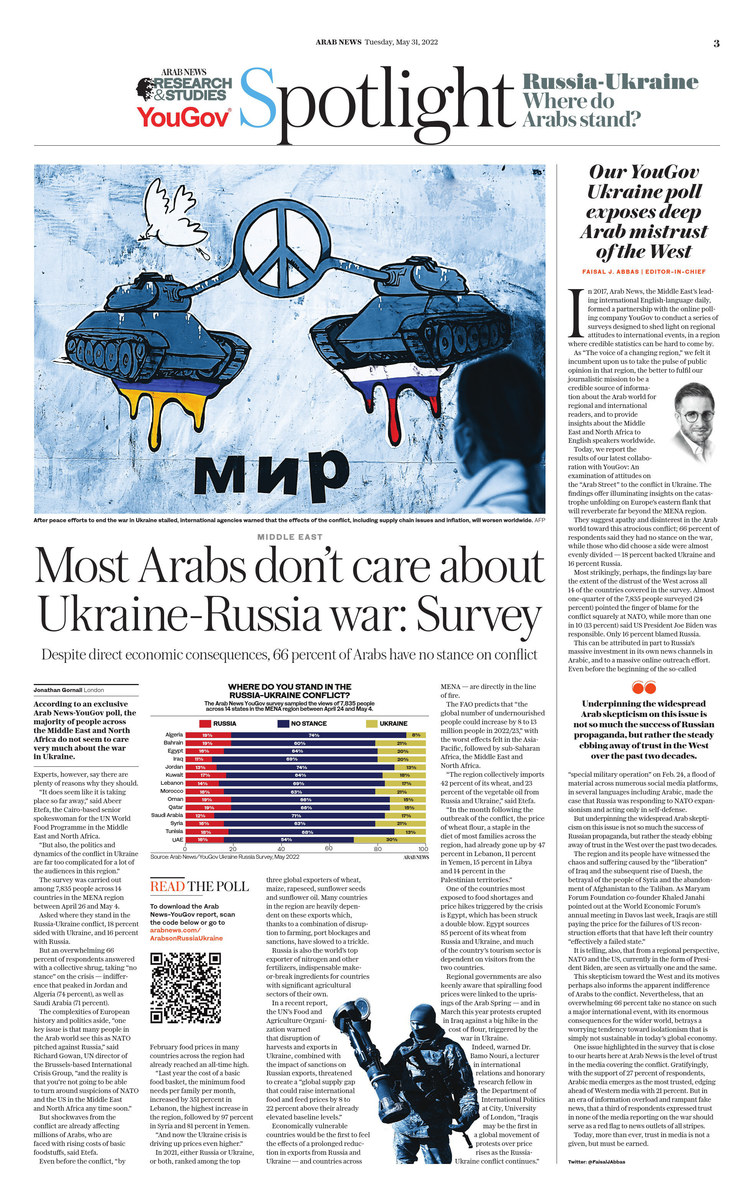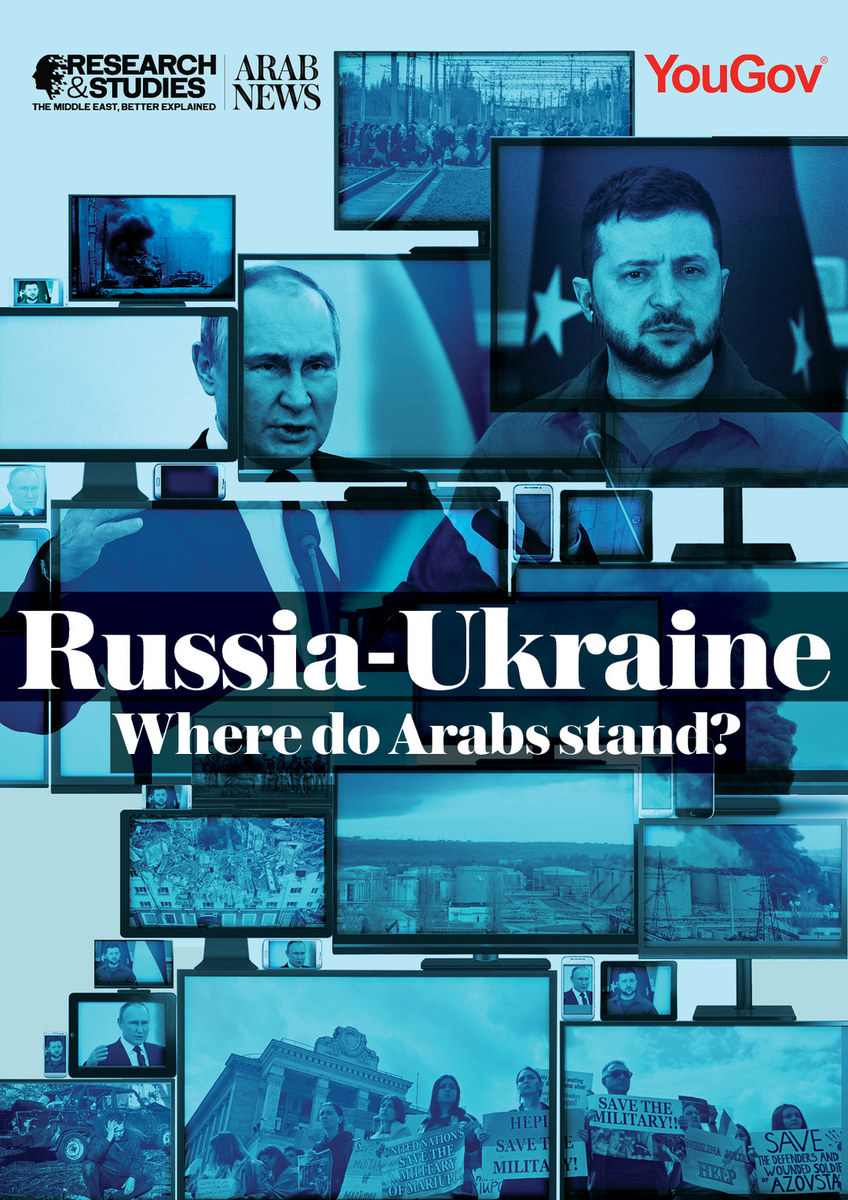Despite direct economic consequences, study finds majority of Arabs do not care about Ukraine-Russia war
LONDON: According to an exclusive Arab News-YouGov poll, the majority of people across the Middle East and North Africa do not seem to care very much about the war in Ukraine.
Experts, however, say there are plenty of reasons why they should.
“It does seem like it is taking place so far away,” said Abeer Etefa, the Cairo-based senior spokeswoman for the UN World Food Programme in the Middle East and North Africa.
Kyiv, Ukraine’s capital, is more than 3,000 kilometers from Riyadh.
“But also, the politics and dynamics of the conflict in Ukraine are far too complicated for a lot of the audiences in this region.”
The survey was carried out among 7,835 people across 14 countries in the MENA region between April 26 and May 4.
Asked where they stand in the Russia-Ukraine conflict, 18 percent sided with Ukraine, and 16 percent with Russia.
But an overwhelming 66 percent of respondents answered with a collective shrug, opting to take “no stance” on the crisis — indifference that peaked in Jordan and Algeria (74 percent) and Saudi Arabia (71 percent).
The complexities of European history and politics aside, Richard Gowan, UN director of the Brussels-based International Crisis Group, sees another reason for the apparent indifference of many Arabs to events in Ukraine.
“We are seeing a very big gap between how Americans and Europeans see this conflict, and how it’s viewed in other parts of the world,” he said.
“One key issue is that many people in the Arab world see this as NATO pitched against Russia, and the reality is that you’re not going to be able to turn around suspicions of NATO and the US in the Middle East and North Africa any time soon.”
Although the fighting in Ukraine and the reasons behind the conflict do indeed have nothing to do with the Arab world, shockwaves from the conflict are already affecting millions of Arabs, who are faced with rising costs of basic foodstuffs, said Etefa.
She added that even if the fighting stopped tomorrow, “the world will need between six months to two years to recover, from a food security perspective.”
Even before the conflict, she said, “by February food prices in many countries across the region had already reached an all-time high.
“Last year the cost of a basic food basket, the minimum food needs per family per month, increased by 351 percent in Lebanon, the highest increase in the region, followed by 97 percent in Syria and 81 percent in Yemen.
“And now the Ukraine crisis is driving up prices even higher.”
Experts had expected wheat from India to make up some of the shortfall from Ukraine, but last week the Indian government banned exports after crops in the country was hit by a heatwave, driving up the prices of some foods to a record high.
Even before the conflict, the WFP was providing assistance to millions across the region, in Yemen, Lebanon and Syria. Now, even as demands on its resources grow rapidly as a result of events in Ukraine, the rise in food and oil prices means the WFP’s own costs have escalated alarmingly.
“This is happening at a very difficult time for the World Food Programme,” said Etefa.
“Because of the war in Ukraine our global operating costs have been pushed up by $71 million a month, reducing our ability to help those in need in the region at a time when the world is facing a year of unprecedented hunger.
“That means that each day, globally, there are four million people fewer we can assist with a daily ration of food.”
Opinion
This section contains relevant reference points, placed in (Opinion field)
Many countries in the region are heavily dependent on food exports from Russia and Ukraine which, thanks to a combination of disruption to farming, port blockages and sanctions, have slowed to a trickle.
Both Russia and Ukraine are among the most important producers of agricultural commodities in the world — in 2021, either Russia or Ukraine, or both, ranked among the top three global exporters of wheat, maize, rapeseed, sunflower seeds and sunflower oil.
Russia is also the world’s top exporter of nitrogen and other fertilizers, indispensable make-or-break ingredients for countries with significant agricultural sectors of their own.
In a recent report, the UN’s Food and Agriculture Organization warned that disruption of harvests and exports in Ukraine, combined with the impact of sanctions on Russian exports, threatened to create a “global supply gap that could raise international food and feed prices by 8 to 22 percent above their already elevated baseline levels.”
Economically vulnerable countries would be the first to feel the effects of a prolonged reduction in exports from Russia and Ukraine — and countries across MENA are directly in the line of fire.
The FAO predicts that “the global number of undernourished people could increase by 8 to 13 million people in 2022/23,” with the worst effects felt in the Asia-Pacific, followed by sub-Saharan Africa, the Middle East and North Africa.
“The region collectively imports 42 percent of its wheat, and 23 percent of the vegetable oil from Russia and Ukraine,” explained Etefa.
“In the month following the outbreak of the conflict in Ukraine, the price of wheat flour, a staple in the diet of most families across the region, had already gone up by 47 percent in Lebanon, 11 percent in Yemen, 15 percent in Libya and 14 percent in the Palestinian territories.”
One of the countries most exposed to food shortages and price hikes triggered by the Ukraine crisis is Egypt, which has been struck a double blow. Egypt sources 85 percent of its wheat from Russia and Ukraine, and a large part of the country’s tourism sector is dependent on visitors from the two countries.
Back at the beginning of February, just before the Russian invasion, Egypt was already suffering from high global wheat prices and the government was considering controversial reforms to the expensive national bread subsidy scheme.
Under the scheme, which at 2022 prices cost the government $5.5 billion, more than 60 million Egyptians receive five loaves of bread a day for just $0.5 a month.
Regional governments are also keenly aware that in various countries spiralling food prices were linked to the uprisings of the Arab Spring — and in March this year protests erupted in Iraq against a big hike in the cost of flour, triggered by the war in Ukraine.
Indeed, warned Dr Bamo Nouri, a lecturer in international relations and honorary research fellow in the Department of International Politics at City University of London, “Iraqis may be the first in a global movement of protests over price rises as the Russia-Ukraine conflict continues.”
There had, he highlighted, “indeed been a trend in various Middle East countries where there has been little interest, with no particular stance on the Russia-Ukraine conflict.”
One reason was that in many Middle Eastern states, “the responsibility to resolve any given crisis is placed on the government, and unless and until it reaches ordinary the reaction or debate around it will be minimal.”
He added: “In the stable oil rich Gulf states, such as Saudi Arabia, the UAE and Kuwait, this may be justified, because the government has the means and the infrastructure in place to keep the domestic impact of any external crisis to a minimum .”
On the other hand, in less stable regional states, such as Iraq and Lebanon, “a large proportion of society watches outside events closely, because they are aware of the repercussions and try to proactively plan and manage the situation, because the government does not have the capacity to do so.”


Study shows Arabs more likely to blame NATO than Russia for Ukraine warMost Arabs distrust media coverage on Russia’s invasion of Ukraine: Poll





